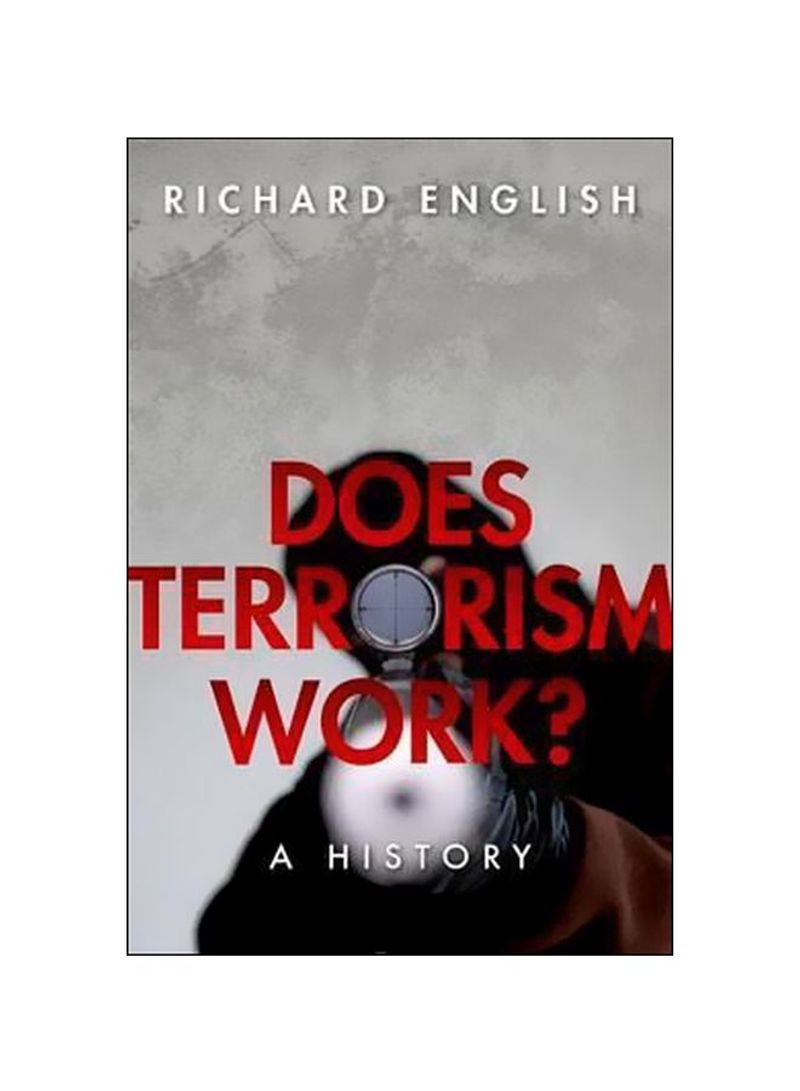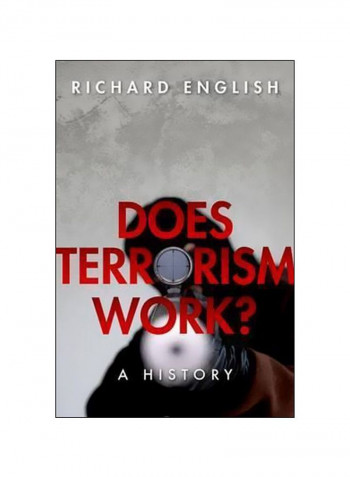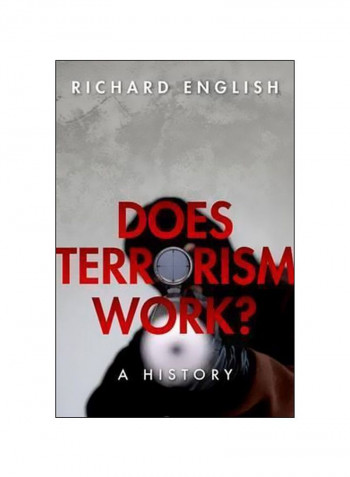Does Terrorism Work? : A History Hardcover
Recommend
Sort by
Rating
Date
Specifications
Author 1
Richard English
Book Description
Terrorism is one of the most significant security threats that we face in the twenty-first century. Not surprisingly, there is now a plethora of books on the subject, offering definitions of what terrorism is and proffering advice on what causes it and how states should react to it. But one of the most important questions about terrorism has, until now, been left remarkably under-scrutinized: does it work? Richard English now brings thirty years of professional expertise studying terrorism to the task of answering this complex - and controversial - question. Focussing principally on four of the most significant terrorist organizations of the last fifty years (al-Qaida, the Provisional IRA, Hamas, and ETA), and using a wealth of interview material with former terrorists as well as those involved in counter-terrorism, he argues that we need a far more honest understanding of the degree to which terrorism actually works - as well as a more nuanced insight into the precise ways in which it does so. Only then can we begin to grapple more effectively with what has become one of the most challenging and eye-catching issues of our time.
ISBN-13
9780199607853
Language
English
Publisher
Oxford University Press
Publication Date
3/Oct/16
Number of Pages
368
About the Author
Richard English is Professor of Politics at Queen's University Belfast, where he is also Distinguished Professorial Fellow in the Senator George J. Mitchell Institute for Global Peace, Security and Justice. His books have won numerous awards, and include Armed Struggle: The History of the IRA, Irish Freedom: The History of Nationalism in Ireland, Terrorism: How to Respond, and Modern War: A Very Short Introduction. He is a frequent media commentator on terrorism and political violence, and on Irish politics and history, including work for the BBC, CNN, ITN, SKY NEWS, NPR, RTE, the Irish Times, Times Literary Supplement, Newsweek, Guardian, and Financial Times. He is a Fellow of the British Academy (FBA), a Member of the Royal Irish Academy (MRIA), a Fellow of the Royal Society of Edinburgh (FRSE), a Fellow of the Royal Historical Society (FRHistS), an Honorary Fellow of Keble College Oxford, and an Honorary Professor at the University of St Andrews.
Editorial Review
A crucial and perceptive guide to understanding modern terrorism and how it affects our lives. * Jonathan Powell, former Chief of Staff to Tony Blair, and chief negotiator on Northern Ireland * This book offers a reflective, astute, and deeply knowledgeable historian's answer to the critical question of "does terrorism work". As it brilliantly demonstrates the complexity and contingency of historical processes, the necessity of understanding different contexts, and the varieties of ways in which terrorism can be effective, it adds immense value to the debate. * Martha Crenshaw, Stanford University * Sensitive and detailed ... The author's aim throughout is a calm analysis of the issues, leading him to suggest that the terrible human costs of terrorism have been far more certain than having any benevolent outcomes brought about politically by it ... a very readable philosophical discussion. * Journal of Contemporary European Studies * Does Terrorism Work? addresses terrorism as a multi-faceted phenomenon, treating seriously the internal motivations and dynamics of those engaged in violence while reflecting on the devastation terrorism produces ... English presents a compelling argument for why a historical account is uniquely valuable ... English succeeds in his ultimate goal of elucidating and demonstrating a more robust framework through which this debate can continue fruitfully [and] provides a model through which that conversation can be pursued in a balanced assessment that is simultaneously engaging, nuanced, and human. * Marine Corps University Journal * Essential reading for everyone wishing to make sense of terrorism ... a reflective, insightful and well-informed historian's response to the vital question, "Does Terrorism Work?" * Army Rumour Service * Fascinating ... a marvellous piece of scholarship ... masterfully-written ... a nuanced account of terrorist practices over the course of numerous decades. * Security Dialogue * What can be construed as success in a terrorist campaign is a worthy subject for scholarly attention ... and the notion of "partial strategic victory" (as explored here) is an intellectually healthy way of thinking about outcomes ... Context is the crucial ingredient when it comes to analysing what amounts to success for a terrorist campaign and, thankfully, this is a book awash with historical detail. This detail will force the reader to think more precisely about the circumstances in which terrorists of many types have been able to proclaim success. * International Affairs * Brilliantly argued and developed ... [a] work of great perspicacity and originality ... the analytical vigour and the depth and breadth of the scholarship are not the only features that render the thesis outstanding. What makes the thesis ... one that should be widely read and engaged with is the humanity, humanism and humility of the author. * Kashmir Reader * There might well be thousands of books on terrorism, which means that it is extremely difficult to imagine something new. But Richard English's Does Terrorism Work? differs from most discussions of the terror phenomenon. English is a distinguished historian ... and is very knowledgeable of the history and development of terrorist groups ... English's meticulous examination of documents and personal testimony from various groups reveals that both leaders and followers who are prepared to kill large numbers of innocent civilians do not necessarily expect to be rewarded with victory over government forces or benefit personally from political transformation. English concludes instead that they are frequently driven by hatred and the desire to get revenge for the suffering and humiliation inflicted on them. * The American Conservative * Important book ... English's analysis encompasses a wide range of parameters including the morality of terrorism, the inefficacy of non-compromise, the role played by erosion of empathy on the part of terrorists, the influence of religion. * The Commonwealth Lawyer * Important ... timely ... vivid ... Professor English is a distinguished historian of the Irish Troubles and knows more than probably anyone else working in the academy about this particular type of terrorism ... English turns his experienced hand to the current threat from radical Islam. [A] nuanced and historically grounded interpretation of what these groups try to and sometimes do achieve. * Caroline Kennedy-Pipe, Government and Opposition * An impressively detailed analysis of a perpetual problem ... Richard English draws on more than thirty years of experience in the field to dissect this timely, if uncomfortable, question. Using four case studies from recent history ... he sets out a rigorous framework to assess how effective each group's activities have been ... This comprehensive title doesn't claim to have the answers, but it certainly makes an interesting contribution to the debate. * The Soldier Magazine * An important book that examines the multiple aims of terrorist violence and its varied and often unplanned outcomes ... By embracing complexity, English succeeds in offering a strong, empirically backed argument for when terrorist violence has worked ... and when it has not. English as a political historian uses a clear and thorough historical methodology for investigating the question in four in-depth case studies ... his interpretation is based on a serious reading of a varied and vast number of sources. * Harmonie Toros, Critical Studies on Terrorism * An expansive and richly textured exploration of the question of whether terrorism realizes the goals of terrorists. * Roger Chapman, H-Net Reviews * An admirable book, extremely well-written, fascinating to read, full of insights, challenging ... excellent and thoroughly documented. * Gianfranco Pasquino, Political Quarterly * Captivating ... Richard English is conscious of the complexity of the subject. It is difficult to submit large scale, seemingly blind violence with a lot of civilian casualties to the objective view of a historian [but] we can get an understanding of these organizations and what you can do against them, if you do not label them in the category of blind, unexplainable violence. * De Standaard (Belgium) * English is a brilliant political historian, with a measured yet hard-hitting analyses. He possesses a formidable range and depth of knowledge about modern terrorism ... Unlike many commentators, his prose is calm; his conclusions sensible. * Joanna Bourke, Prospect * A valuable resource for scholars ... as English suggests, we need to ask for whom terrorism works, and why. * John Gray, New Statesman * Timely ... valuable ... a very interesting book. * Thomas Nagel, London Review of Books * [An] elegant academic disquisition ... English's most significant point is that the military over-reaction to a terrorist strike invariably generates more terrorist attacks. * London Evening Standard * His disinterested approach allows the author to avoid the polemicism that clouds many accounts of this question. Indeed, his clear-eyed treatment of a fraught subject is one of the book's principal strengths ... he presents an admirably clear framework that allows for various possible achievements. * Ali Soufan, Wall Street Journal * [An] absorbing attempt to answer a difficult question: does terrorism work? ... The author admits some people might struggle with daring even to ask whether terror works. He carefully sets out his criteria ... insisting there can be no simple answer given the overwhelming complexities involved. Yet that does not make his work less valid. * Ian Birrell, Observer * [A] thought-provoking, scholarly study. * Irish Times *



